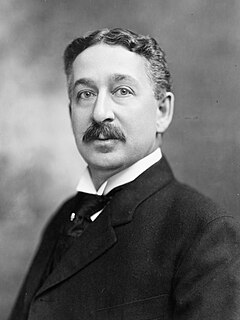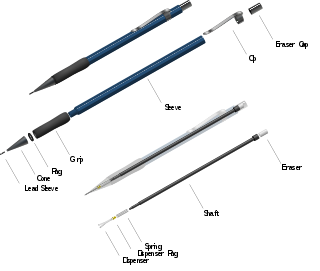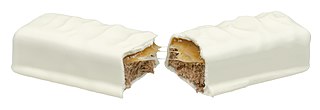History
Autopoint was founded by Frank C. Deli, Michael M. Kaufmann, and John P. Lynn around 1920. They used the name "Realite Pencil Company." They worked with Lawrence V. Redman of the Redmanol Company to develop techniques for molding plastic bodies for pencils. They took out several patents on plastic molds. The company continued to do business with Redmanol, and later with Bakelite Corporation after Redmanol had been merged into it.
In the early 1920s, they made a business alliance with Charles Keeran, who had been the founder of the Eversharp Pencil Company. Keeran had previously registered the trademark "Autopoint." Eventually, the company took the name Autopoint. The company continued to use the brand name "Realite" for its line of less expensive pencils until World War II.
Around 1925, the Bakelite Corporation gained a controlling interest in the Autopoint Company. Bakelite bought out founders Kaufmann and Lynn, and appointed a president who reported to Bakelite. Deli remained an officer of the Autopoint Company until his death in 1946. Bakelite did not integrate Autopoint into its organization but operated Autopoint as a separate company.
The Autopoint trademark (No. 125,149) was registered by Keeran on April 15, 1919. The trademark was used by the Autopoint Company in Chicago from the 1920s to the 1970s. It is now used by Autopoint, Inc., in Janesville, Wisconsin.
In 1951, the Cory Corporation, a Chicago company, bought Autopoint from Union Carbide which had acquired Bakelite in 1939. Cory operated Autopoint as a division appointing the president. In the 1950s, Julius Lederer served as president of Autopoint.
Autopoint was a job shop preparing advertising pencils for many different companies. In the 1950s and 1960s, their product line also included a number of other plastic desk accessories.
In the 1967, the Hershey Chocolate Corporation bought the Cory Corporation. A few years later, Hershey sold Autopoint to Gillette which merged it with its Papermate division. Gillette dismantled the Autopoint sales organization, sold the Autopoint plant in Chicago, sold or discontinued much of its product line, and greatly reduced the number of models of pencils produced. The pencils that Gillette continued to produce were reengineered to allow more interchangeability of parts between the different models of pencils.
Around 1980, Gillette sold the Autopoint name and machinery to produce Autopoint pencils to a group of business men from Janesville, Wisconsin. They founded Autopoint-Janesville Inc. which continued to manufacture and sell pencils and other products under the Autopoint brand. In 2013, the company was sold again, to Jason Bender, who continued selling Autopoint-branded pencils but began making pencils for Oregon-based Rite in the Rain, a manufacturer of waterproof notebooks as the "Model 99," with plain clips and screen-printed barrels.
Rite in the Rain negotiated a contract for the exclusive rights to distribute Autopoint products, although it is unclear whether a final agreement was reached. Rite in the Rain also considered purchasing the company outright, but decided the risk was to great when it became clear Autopoint was falling behind on its bills. In 2020, Autopoint defaulted in its rent payments for the company's factory, and in 2021 Autopoint's landlord proceeded with an eviction, giving Jason Bender until April 11, 2022 to sell the company and vacate the building. Bender failed to do so, abandoning all of the remaining machinery, stock, and parts at the Janesville plant. Autopoint's landlord contacted Jonathan Veley, a mechanical pencil enthusiast whose 2019 book, A Century of Autopoint, established him as the most likely person who might be interested in reviving the company.
Veley formed the Legendary Pencil Company, LLC, which acquired all of Autopoint's abandoned property including enough assembled components to manufacture thousands of pencils. The Legendary Pencil Company introduced 18 models based on the former "Jumbo" Autopoints in July 2022. engraved with vintage patterns using proprietary processes to create a more upscale product. Veley has plans to resume full-scale production.

Polyoxybenzylmethylenglycolanhydride, better known as Bakelite, is a thermosetting phenol formaldehyde resin, formed from a condensation reaction of phenol with formaldehyde. It was the first plastic made from synthetic components, and was developed by the Belgian chemist Leo Baekeland in Yonkers, New York, in 1907.

King Camp Gillette was an American businessman. He invented a best-selling version of the safety razor. Gillette's innovation was the thin, inexpensive, disposable blade of stamped steel. Gillette is often erroneously credited with inventing the so-called razor and blades business model in which razors are sold cheaply to increase the market for blades. However, Gillette Safety Razor Company adopted the business model from its competitors.

Leo Hendrik Baekeland (November 14, 1863 – February 23, 1944) was a Belgian chemist. He is best known for the inventions of Velox photographic paper in 1893, and Bakelite in 1907. He has been called "The Father of the Plastics Industry" for his invention of Bakelite, an inexpensive, non-flammable and versatile plastic, which marked the beginning of the modern plastics industry.

Formica Laminate is a laminated composite material invented at the Westinghouse Electric Corporation in the United States in 1912. Originally used to replace mica in electrical applications, it has since been manufactured for multiple applications. Today, the product is produced by New Zealand–based Formica Group, and has been since 2007. The word Formica refers to the company's classic product: a heat-resistant, wipe-clean laminate of paper or textile with melamine resin.

The Parker Pen Company is an American manufacturer of luxury writing pens, founded in 1888 by George Safford Parker in Janesville, Wisconsin, United States. In 2011 the Parker factory at Newhaven, East Sussex, England, was closed, and its production transferred to Nantes, France.
The Waterman Pen Company is a major manufacturing company of luxury fountain pens and inks, based in Paris, France. The firm was established in 1884 in New York City by Lewis Waterman, being one of the few remaining first-generation fountain pen companies, as "Waterman S.A."

Testor Corporation is an American manufacturer of tools and accessories for scale model kits. The business is based in Rockford, Illinois and is part of RPM International. It was founded in 1929 and its products are made in the US and marketed to customers worldwide.

A mechanical pencil, also clutch pencil, is a pencil with a replaceable and mechanically extendable solid pigment core called a "lead". The lead, often made of graphite, is not bonded to the outer casing, and can be mechanically extended as its point is worn away as it is being used.
John P. Lynn was a Chicago businessman.

Charles Rood Keeran was an Illinois inventor and businessman.
Michael Kaufmann was a Chicago businessman.
Frank Deli was a Chicago businessman.
S. Karpen & Bros. was a Chicago-based furniture manufacturing firm that specialized in upholstered furniture.

The Zero candy bar, introduced in 1920, is a candy bar composed of a combination of caramel, peanut and almond nougat covered with a layer of white chocolate fudge. Its outwardly white color — an unusual color for a candy bar — has become its trademark. The candy bears resemblance to Snickers, a candy manufactured by Mars, Incorporated except that the candy is dark brown instead of white.

Kay Musical Instrument Company was an American musical instrument manufacturer established in 1931 by namesake Henry "Kay" Kuhrmeyer and based in Chicago, Illinois. It was formed when Kuhrmeyer bought out his financial backers in the instrument manufacturer Stromberg-Voisinet. They produced guitars, mandolins, banjos, ukuleles and were known for their use of lamination in the construction of arched top instruments.

Hershey Creamery Company, also known as Hershey's Ice Cream, is an American creamery that produces ice cream, sorbet, sherbet, frozen yogurt, and other frozen desserts such as smoothies and frozen slab-style ice cream mixers. It was founded by Jacob Hershey and four of his brothers in 1894 and taken over by the Holder family in the 1920s. The company was one of the first to offer consumers pre-packaged ice cream pints.

Charles Bird Plimpton was an English inventor and businessman. He invented Bayko in 1933, a plastic building model construction toy, and one of the earliest plastic toys to be marketed. He established Plimpton Engineering in Liverpool, England, to manufacture the toy, which was sold across the world for over 30 years.

A resonator mandolin or "resophonic mandolin" is a mandolin whose sound is produced by one or more metal cones (resonators) instead of the customary wooden soundboard. These instruments are sometimes referred to as "Dobro mandolins," after pioneering instruments designed and produced by the Dopyera Brothers, which evolved into a brand name. The trademark "Dobro" is currently the property of the Gibson Guitar Corporation. When Gibson acquired the trademark in 1993, they announced that they would defend their right to its exclusive use.
Eversharp is an American brand of writing implements founded by Charles Rood Keeran in 1913 and marketed by Keeran & Co., based in Chicago. Keeran commercialised Eversharp mechanical pencils, then expanding to fountain pens when the company was acquired by the Wahl Adding Machine Co. in 1916 and it was named "Wahl-Eversharp". The company continued until 1957 when it was acquired by Parker Pen, which continued to use the Eversharp brand for a time.
Harvey Cory patented his glass filter rod design, for which the patent was granted in 1939.













